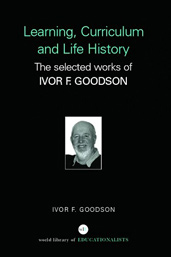Learning, Curriculum and Life Politics: the selected works of Ivor F. Goodson
Nations at Risk
Conclusion
The introduction of the national curriculum in the UK has been linked to the problems of national economic decline and a belief that curriculum co-ordination will aid a project of national economic regeneration. Behind the rhetorical priority given to economic revival, two other agendas have been discerned.
First, the reconstitution of a traditional subjects-based curriculum. These traditional subjects evoke a past 'golden age' when schooling was selective and people 'knew their station'. A number of empirical studies have pointed up the links between traditional subjects and social class.4 The obsessive presentism of many of the current government initiatives has successfully obscured this deeply-embedded connectedness which is of course relevant to the present and future of the UK as a class society.
In developing this commentary for a global audience, it is important to note the distinctiveness and strength of UK class politics. For instance, in the USA at the moment a debate is underway about defining a national curriculum comprising traditional subjects. However, the intention, at least one important intention, is to provide rigorous academic subject-based courses of study covering curriculum content and form which will appeal to all children. Hence, the pattern of state and class-formation in the USA mean that a national curriculum initiative will have sharply different resonances to those in a somewhat obsolescent class-based society like the UK. (This is not, of course, to say that an initiative in the USA will not have powerful implications for matters of class, race and gender). Moreover, the patterns of civic culture, citizenship education and constitutional rights are sharply different in the UK from the USA: So that once again a national curriculum will be likely to affect the two societies differently.
The second agenda in the UK is one of establishing new modalities of control over schooling on behalf of the nation-state. These new modalities will allow detailed control to be exercised over the school curriculum, both in terms of content, form and assessment. In the UK case this would seem a late and somewhat desperate attempt at nation-building, both in terms of nation-state governance and the partial propagation through curriculum of national ideologies, selective memories and images. It would seem possible that declining nations in their post-imperial phase have nowhere to go but to retreat into the bunker of the school curriculum. In this case, in particular, there may well be some lessons for the USA.
